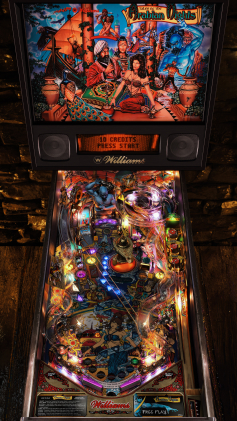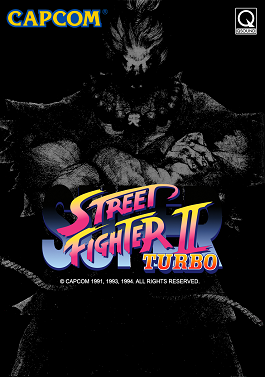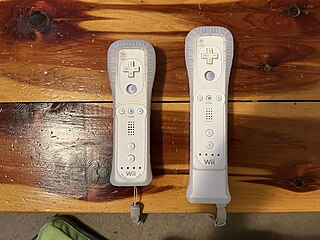
The Nintendo 64 (N64) is a home video game console developed and marketed by Nintendo.It was released in Japan on June 23, 1996, in North America on September 29, 1996, and in Europe and Australia on March 1, 1997. The successor to the Super Nintendo Entertainment System, it was the last major home console to use cartridges as its primary storage format until the Nintendo Switch in 2017. As a fifth-generation console, the Nintendo 64 primarily competed with Sony's PlayStation and the Sega Saturn.

The history of video games began in the 1950s and 1960s as computer scientists began designing simple games and simulations on minicomputers and mainframes. Spacewar! was developed by Massachusetts Institute of Technology (MIT) student hobbyists in 1962 as one of the first such games on a video display. The first consumer video game hardware was released in the early 1970s. The first home video game console was the Magnavox Odyssey, and the first arcade video games were Computer Space and Pong. After its home console conversions, numerous companies sprang up to capture Pong's success in both the arcade and the home by cloning the game, causing a series of boom and bust cycles due to oversaturation and lack of innovation.

The GeForce 2 series (NV15) is the second generation of Nvidia's GeForce line of graphics processing units (GPUs). Introduced in 2000, it is the successor to the GeForce 256.

Visual Pinball ("VP") is a freeware and source available video game engine for pinball tables and similar games such as pachinko machines. It includes a table editor as well as the simulator itself, and runs on Microsoft Windows. It can be used with Visual PinMAME, an emulator for ROM images from real pinball machines.

Super Street Fighter II Turbo, released in Japan as Super Street Fighter II X: Grand Master Challenge is a 1994 fighting game released for the arcades by Capcom. It is the fifth installment in the Street Fighter II sub-series of Street Fighter games, following Super Street Fighter II: The New Challengers (1993). Like its predecessor, it ran on the CP System II hardware.
PowerVR is a division of Imagination Technologies that develops hardware and software for 2D and 3D rendering, and for video encoding, decoding, associated image processing and DirectX, OpenGL ES, OpenVG, and OpenCL acceleration. PowerVR also develops AI accelerators called Neural Network Accelerator (NNA).

Allianz Global Investors, is a global investment management firm with offices in over 20 locations worldwide. It is owned by the global financial services group Allianz. Employing nearly 3,000, it manages over EUR 500 billion in assets on behalf of institutional, retail clients and also of Allianz itself. AGI became known for one of the biggest fraud cases in which its Structured Alpha fund lost over 6 billion dollars in the 2020 market sell-off. As the risk profile of the fund was missold to the investors it led to charges against the company and its managers.
UltraPin is a Multi-Game pinball arcade game that holds 12 digital recreations of Williams Electronics real pinball games in a single pinball cabinet. UltraPin is built in a traditional style pinball cabinet to look and feel like a real pinball machine. It has two LCD screens, a 19 inch LCD for the back glass and DMD, and a 32 inch LCD for the playfield, and it uses Windows XP Embedded for its operating system.

Global VR is company based in San Jose, California, that makes arcade games. The company once manufactured virtual reality stands as well. It has also developed electronic kiosks and offers development services for mobile platforms.
Sensory Sweep Studios was an American developer of video games. The studio was located in Salt Lake City, Utah.

In computing, a motion controller is a type of input device that uses accelerometers, gyroscopes, cameras, or other sensors to track motion.

Virtuality was a range of virtual reality machines produced by Virtuality Group, and found in video arcades in the early 1990s. The machines delivered real-time VR gaming via a stereoscopic VR headset, joysticks, tracking devices and networked units for a multi-player experience.

ExZeus is a video game developed by HyperDevbox Japan. Despite the company's name, it was founded by Carlo Perconti, one of the founders of the France-based video game company Toka who moved to Japan and set up a game development studio in Tokyo. It was released in 2003 for the arcades running on a Tsunami Visual Technologies TsuMo arcade cabinet and was later released for Microsoft Windows as shareware. In 2004, a PlayStation 2 version was released, but only in Europe. Then in 2005, the game had a re-release in the arcades, this time running on Sega NAOMI GD-ROM hardware, and only released in Japanese arcades. It was later released to the Wii under the working title of Shoot Out, later changed to Counter Force, and released in 2007. It was ported in 2009 for the iPhone by Octopus Studio, under the name ExZeus. An Android port by Octopus Studio was released in 2010.

Street Fighter is a Japanese media franchise centered on a series of fighting games developed and published by Capcom. The first game in the series was released in 1987, followed by six other main series games, various spin-offs and crossovers, and numerous appearances in other media. Its best-selling 1991 release Street Fighter II established many of the conventions of the one-on-one fighting genre.

IndieCade is an international juried festival of independent games. Game types include video games, live-action games, and tabletop games. Independent game developers are selected to demo, screen, and promote their work at the annual IndieCade festival and showcase events. IndieCade also includes a conference track featuring classes, panels, workshops, and keynotes. Since 2020, the annual festival has taken place online under the name IndieCade Anywhere & Everywhere.
William James Toye was an art forger in Baton Rouge, Louisiana. He painted in styles copied from Paul Gauguin, Pierre-Auguste Renoir and Alfred Sisley; Toye also copied the style of Claude Monet. Toye, his wife, and Robert E. Lucky, a New Orleans art dealer, were indicted on charges of conspiracy to commit mail fraud in 2010. On June 6, 2011, Toye pleaded guilty to conspiracy to sell counterfeit Clementine Hunter paintings, to misrepresenting the authenticity and origin of the paintings, and to painting the counterfeited Hunter artwork. William and Beryl Toye pleaded guilty to mail fraud charges in 2011 and were sentenced to two-years probation and ordered to pay $426,393 in restitution to the victims of the fraud. Robert Lucky was also convicted of mail fraud in January 2012 and was sentenced to 25 months in prison.

The Virtuix Omni is an omnidirectional treadmill simulator for virtual reality games and other applications. It uses a platform to simulate locomotion i.e. the motion of walking, requiring both special shoes or shoe covers and a surface that reduces friction. It works in conjunction with the HTC Vive, and allows a Vive user to physically walk within a limited number of supported games.

GameFace Labs is an American technology company that develops hardware and software for the consumer virtual reality market, and was founded in 2013 by Edward Mason. The company's headquarters are in San Francisco, with international offices in London, United Kingdom.














